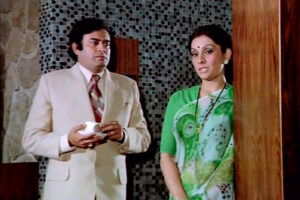The casually blatant sexism of the 1978 movie Pati Patni Aur Woh may have seemed funny at one time, but it is nothing short of tragic that the film is being remade in this age, writes Deepa Gahlot
Any plot can be updated and recycled, but one thing is certain—no current leading man will be seen dead in striped kuchhas, unashamedly displaying an overweight body, as Sanjeev Kumar did in the 1978 version of Pati Patni Aur Woh, singing “Thande thande paani se” in the bathroom.
The BR Chopra film was a hit, but the casual misogyny of the plot would be rejected today, so the new film retains just the title and bare bones of the plot.
The film begins with a surprisingly good animated sequence about Adam and Eve tasting the forbidden fruit and being cast out of heaven—the fruit being the temptation of ‘woh.’ Cut to a portly Ranjit (Kumar), and a svelte Sharda (Vidya Sinha) cycling down empty streets and colliding. For him, it is love at first sight, for her it takes a friend’s wedding and a song (Ladki cycle wali) to marry him.
At 28 years of age, the man does not know what to do on a wedding night, and is given some bawdy advice by his paan-chomping poet friend Durrani (Asrani), which includes the old “billi marna” chestnut. He tries to be a dominating husband for just a day, when the wife protests, and the relationship evens out.
Eight years later, he has progressed in his sales job, they live in a bungalow and have a son (Master Bittoo). His flirtatious nature is alluded to when he offers a lift to a woman in a dress, sweet-talks her, and unceremoniously offloads her on the street when she mentions a husband.
Then, the pretty Nirmala Deshpande (Ranjeeta) arrives as his new secretary and Ranjit is bowled over. He looks rather pointedly at the zipper on her dress—if the film were made by another director, he would have mentally unzipped it too. But he openly leers at her and asks why a pretty girl with a good figure needs to work. And Nirmala replies that she needs the money, otherwise which Hindustani girl would like to take up a job? (In 2019, that line would probably cause a mass exodus from the cinema.
Cliched character
The film seems to suggest that a young woman, dressed in western outfits, who steps out of the home to work, is up for grabs. Durrani just ogles, spouts bad poetry and contrives to keep bumping into her, but Ranjit launches a full seduction plan by claiming his wife suffers from a terminal illness, and wins Nirmala’s sympathy. Suddenly, there is “overtime” as an excuse to meet her. Again, it’s a BR Chopra film, there is no visual of them in bed, but Ranjit is seen reading the Kama Sutra in the loo, later, there is a line about her giving “sab kuchh” to her married lover and Sharda saying he sullied (“Kharab kiya”) Nirmala.
Ranjit has to keep coming up with convincing lies to assuage his wife’s suspicions and goes to the extent of writing two diaries and leaving them around for the two women to read about his love for them. Sharda does catch on eventually and goes to meet Nirmala. Both are shocked at Ranjit’s deception; Sharda is actually sympathetic towards the secretary. It is the writer (Kamleshwar) and director’s cruelty towards a sweet-natured, trusting Nirmala that they make her say that she fell for an older Ranjit for his money, because “middle class” people are deprived of things money can buy. She does, however, return to his wife, the money he gives her for her grandfather’s surgery. It may help heal your marriage, she tells Sharda.
When Ranjit brings along Durrani to discredit Nirmala, Sharda says she has had enough and packs her bag to leave, only to be confronted by her son at the door asking where she is going.
Horrible chauvinism
The film might have covered up the blatant sexism at this point by having the wife stay in the marriage for the sake of the child and even granting the creepy man a promotion. But Ranjit tells Durrani that women can love just one man, while men are capable of distributing their love to many women. His horrible chauvinism and disregard for his wife’s feelings come to the fore when a pretty new secretary (Parveen Babi) arrives, and the cycle begins again.
Extra-marital affairs were not unheard of even 40 years ago, and Hindi cinema has also taken up the subject in a few films; it’s the attitude that remains disturbing—if a man strays it is funny and a woman has to accept it, or undergo a makeover to win him back. If a woman has an affair, she has to be punished with disgrace or death, and the husband who takes her back is portrayed as noble.
That the film has been remade in 2019, shows that not much has changed in the interim. As the old film and the new convey, it is up to the woman to keep a marriage going, men are like that only.








